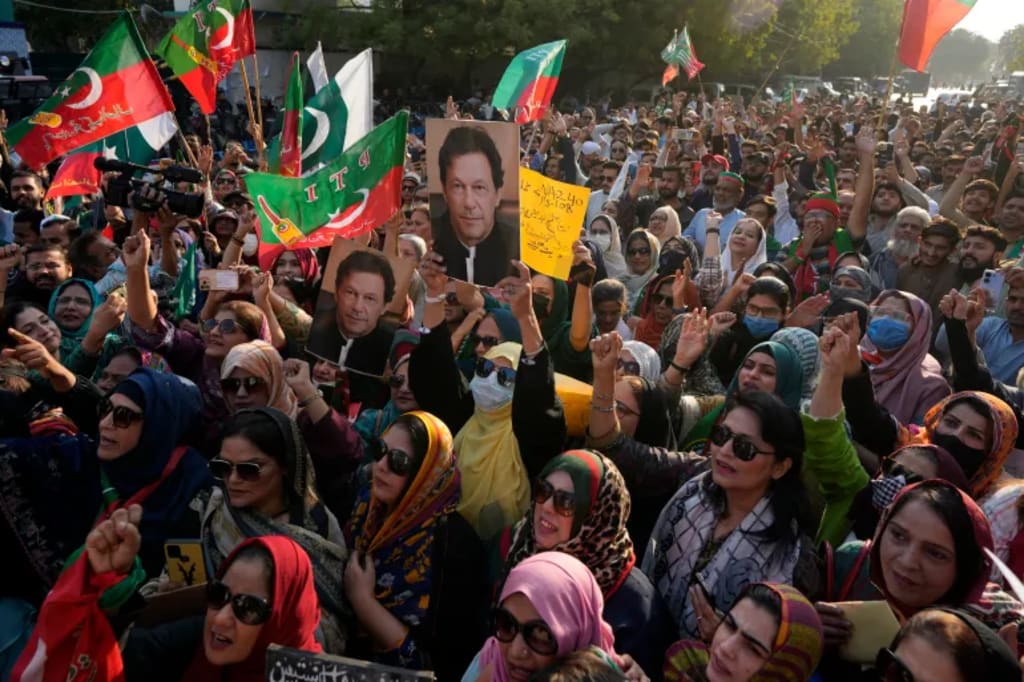Pakistan election: Can Imran Khan’s winning candidates form a government?
Pakistan election

Pakistan is in political limbo after a split verdict. But what options does Khan’s PTI have, after candidates won the most seats?
Islamabad, Pakistan — Five days after the elections on February 8, Pakistan is nowhere closer to knowing which parties are going to make its next government and who might be its next prime minister.
The elections delivered a split mandate amid a cloud of questions over the fairness of the climate in which they were held, allegations of serious manipulation, and challenges to the accuracy of the vote counts that dragged on for three days.
Leading with 93 seats are the candidates affiliated with the Pakistan Tehreek-e-Insaf (PTI) of former Prime Minister Imran Khan, who were forced to contest the election as independents, without their electoral symbol, the cricket bat.
They are followed by the Pakistan Muslim League-Nawaz (PMLN) of three-time ex-Prime Minister Nawaz Sharif, which has won 75 seats and in theory, is the single-largest party in the National Assembly, even though the figure amounts to less than a third of the 266 seats that were up for grabs on February 8.
In third place is the Pakistan People’s Party (PPP) led by former Foreign Minister Bilawal Bhutto Zardari, which has secured 54 seats.
But can the PTI-backed independents form or join a government, what are the options for the party, and what comes next for the country?
What’s needed for a government to be formed?
A party or coalition needs a simple majority of 134 seats out of the 266 that were voted on in the National Assembly, to form a government.
A coalition can consist of multiple parties or also include independents who won their seats.
Those independent candidates can either formally join a party that is aiming to form a government or enter an alliance with them while holding their individual identity.
While technically, the PTI-backed independents could form the core of a government in alliance with other parties, whose support they would need to get to the 134-seat mark, such a path presents several challenges.
Firstly, maintaining stability would be difficult. Such a government would depend on the individual whims of independent parliamentarians, making it susceptible to defections and potential collapse.
Secondly, as a collection of independents, the PTI bloc would have to forfeit access to a chunk of the 70 seats reserved for women and minorities, which are shared proportionately among parties represented in the National Assembly.
But if PTI-backed independents were to join another party, they would come under the discipline of that parent party, potentially compromising their ability to act according to the policies and plans of the PTI.
How soon must a government be formed after polls?
Basil Nabi Malik, a Karachi-based lawyer, said that according to the constitution, a new National Assembly session must be summoned within three weeks of the elections.
“The law clearly states that the National Assembly shall meet on the 21st day following the day on which the election to the assembly is held, unless sooner summoned by the president,” he told Al Jazeera.
Unless Arif Alvi, the president, calls the session sooner, 21 days get over on February 29.
On the day of the session, if the parties have finalised their allies and agreed on a coalition, the members of the house will be asked to vote for the prime minister, speaker and deputy speaker.
A leader of the opposition will also be selected from one of the parties which have decided against sitting on the treasury benches.
Which parties have made a move?
PMLN supremo Nawaz Sharif said in a speech on Friday from the party headquarters in Lahore that he had instructed his brother Shehbaz Sharif, also a former prime minister, to reach out to other political parties which have won several seats in the election, to build a governing alliance.
The PMLN leadership has already met with counterparts from the PPP, as well as representatives of the Muttahida Qaumi Movement (MQM), which won 17 seats in Sindh province.
Still, the parties have not declared whether they plan to go ahead with an alliance — and what the contours of any coalition might look like.





Comments (1)
Interesting article! I’ll have to keep track of this! Thank you!